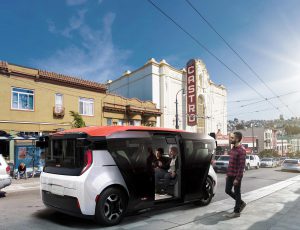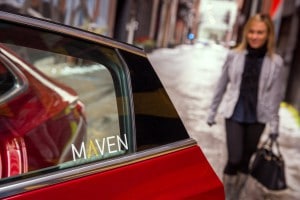General Motors told the 230,000 subscribers to its Maven car-sharing service that it will no longer accept reservations.
The project, first launched four years ago, was expected to position GM as a major player in the “sharing” economy. But while ride-sharing services like Uber and Lyft have found a solid niche, car-sharing never really took off. Share Now, which was originally known as Car2Go, ended its North American operations in February.
Questions about the longtime viability of all forms of vehicle sharing have been touched off by the coronavirus pandemic. The business “is a disaster right now because nobody wants to be getting into vehicles used by other people or ridden in by other people for fear of the virus,” said Michelle Krebs, an executive analyst with Cox Automotive.
(GM’s Maven car-sharing service exiting eight of 17 North American markets.)
Unlike conventional car rental services, like Avis and Hertz, car-sharing services focus on short-term loans – Maven supplying cars like the Chevrolet Cruze for as little as $9 an hour. The original idea was to target customers in urban communities who might not own a vehicle, or commuters who might need a car for a quick errand. Maven also wound up setting up a Gig program for those who might want to work for car-sharing or food delivery programs like Uber or Postmates.
GM also used Maven to test out its electric vehicles, notably the long-range Chevrolet Bolt EV, monitoring its operation to help track things like battery life.
Maven customers didn’t have to go to a central office, as with a traditional car rental company. Instead, they simply loaded an app onto their mobile devices and then found the nearest vehicle stationed somewhere in their community.
Maven debuted in 2016 and, at its peak, operated in 24 different markets in the U.S. and Canada, including Los Angeles, Toronto and Washington, D.C. But there were clearly signs of trouble and by the beginning of 2019 it was already down to 17 markets. Last May it announced plans to quit eight more.
In an e-mail to subscribers sent on Tuesday, Maven advised them that, “Effective immediately, Maven Car Sharing will no longer be available.”
A spokesman later explained that GM determined that the car-sharing service required too large of an upfront investment with high operating costs that didn’t line up with the potential opportunities for profitability and growth.
(GM expanding Maven peer-to-peer rentals to include other brands.)
The service will now sell off the 1,400 vehicles it had stationed around the country.

GM now plans to focus on its own driverless ride-sharing shuttle operation through San Francisco-based Cruise.
What is left of Maven will be transferred to GM’s Global Innovation group. It will look to see if it can come up with any alternative services the automaker might launch in the future.
“We’ve gained extremely valuable insights from operating our own car-sharing business,” said Pamela Fletcher, GM’s vice president of global innovation. “Our learnings and developments from Maven will go on to benefit and accelerate the growth of other areas of GM business.”
GM isn’t abandoning the alternative transportation sector entirely. Early this year it unveiled the Cruise Origin, a fully driverless shuttle that will be used as part of a ride-sharing service it plans to launch in select cities, such as San Francisco.
GM isn’t the only company to rethink its car-sharing options. On February 29, Share Now abandoned the North American market after concluding it couldn’t make a go of it. The service was operated jointly by BMW and Mercedes-Benz and was originally launched by Mercedes as Car2Go. Another early entrant into the field, ZipCar, has also pared back sharply over the last several years.
Ford Motor Co. took a somewhat different approach to the emerging, alternative transportation field, experimenting with its own Chariot shuttle service. It shut that operation down last year after achieving only lackluster results.
(Maven to let GM vehicle owners to profit from car sharing.)
GM did not directly link the demise of Maven to the coronavirus pandemic, but experts have been questioning just what the long-term impact of the viral outbreak might be on vehicle sharing programs, both car-sharing and ride-sharing. Usage for both has tumbled during the near nationwide lockdown – with one key exception in the form of food and grocery delivery operations that have seen a surge in demand as folks try to avoid going into stores for risk of being exposed to the coronavirus.


